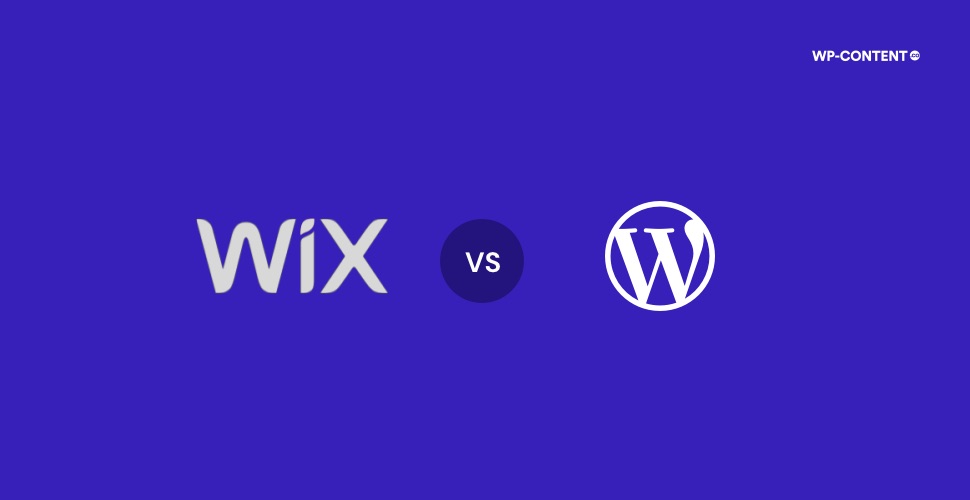Every now and then we hit a crossroads not knowing which path to choose. Even if you decide on one, how the path will unwind, whether it be smooth sailing or not, is something that only time will tell.
Now, deciding whether to go with WordPress or Wix can put users in a similar scenario. One needs to know the platform inside out before making a choice or else the little surprises down the road can rob you of a pleasant experience.
We will explore both platforms in detail, their offerings, and shortcoming, and thereby help you to make the right decision.
WordPress Vs Wix: CMS Vs Website Builder
Wix is a website builder, and WordPress is a CMS (Content Management System). Let’s start off with WordPress.
WordPress essentially started out as a blogging platform and over the course of years evolved to be the leading CMS out there. Now if you search for WordPress, you will find that there are two versions of it. We will be focusing on the self-hosted, open-source version which is free to use and we will get to this part in a bit.
Wix on the hand is a website builder that helps you get things done without needing to code. This will sound good for a set of users out there, but it is not free to use. It is a paid service where you are billed monthly.
Now the points mentioned above are the most visible ones. But there are a lot more details below the surface that one needs to know before choosing either one of them. Every single one of them we are about to mention will play a crucial role as long you have an online presence.
Also read: History of WordPress – Matt, Mike and a bit of Jazz
WordPress Vs Wix: What Lies Beneath the Surface
Surely, a quick glance over the features page can give you an idea, but not how it will turn out in the real world. The features are there to grab your attention, but their ease of use and how beneficial they are going to be is something only time will tell. Moving from one platform to another midway can be challenging and can disrupt your growth.
In order to avoid making such a mistake, we will cover WordPress vs Wix based on various categories right from the ease of use to its features and their benefits, and help you choose the right platform.
1. The Initial Setup Process
When it to comes to the initial setup process both of them take different approaches.
Wix enables you to complete all the required tasks to set up an online website without switching tabs or visiting multiple websites like WordPress, which we will discuss in a bit. It offers customers the ability to choose a custom domain name and also provides their own hosting server once the initial setup is started. If needed users can also connect their own domain from a different domain registrar if they have opted for a premium plan.
WordPress, on the other hand, is a bit different. Firstly you need to buy yourself a domain from a domain registrar, then choose a hosting provider, choose a hosting plan, and then finally install the software itself.
The initial setup process involves a few more steps but offers you a lot of flexibility, in terms of pricing and features.
2. Pricing and Features
WordPress is an open-source CMS that is free for everyone, the self-hosted version that is. But everything that is needed to run it will cost you, and how much it will cost you is entirely up to you. By this we mean the domain registrar you opt for and the hosting service provider and the plan you commit to will decide how much money you have to spend. With many hosting service providers, frequent discounts are an everyday thing.
With Wix, the users have only one option, which is to go with any of the plans they offer. The platform also offers a limited set of domain extensions, and hence if you don’t find the extension of your liking, you have to depend on an external domain registrar and connect it to your premium account.
Now for Wix, their lowest-priced plan will cost you $16 dollars per month. This plan offers you 2 GB storage and video hours of 30 minutes. Now all the WordPress hosting service providers do offer more like no limit on video hours and better storage plans.
Also read: Where to Get Your Domain Name From
3. Ease of Use
When it comes to ease of use, Wix has a slight edge. Here, you can simply signup and start the website creation process without any delay.

Once you signup, follow the on-screen instructions to get started. From the dashboard, you can make the necessary changes.
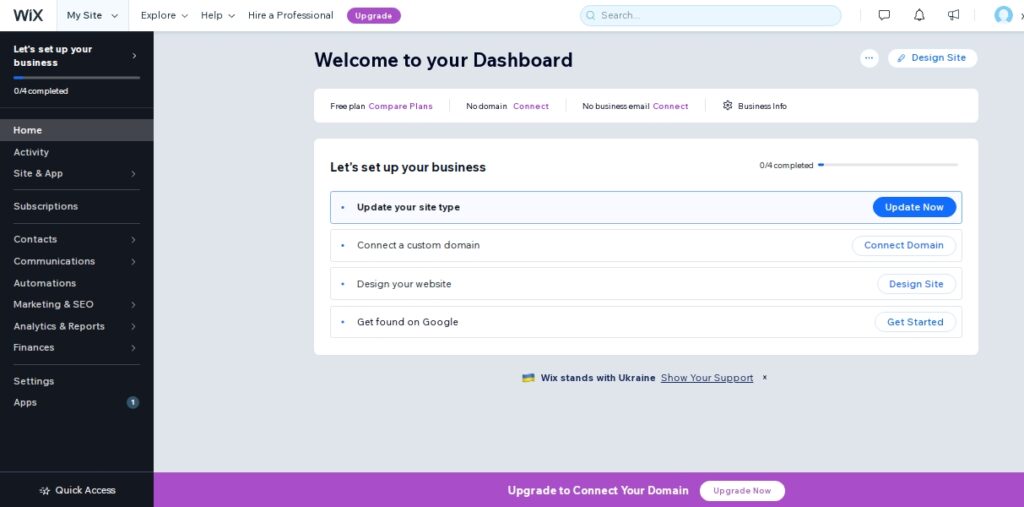
Wix offers two different ways for users to design their websites. Either choose a template or let the system design it for you.
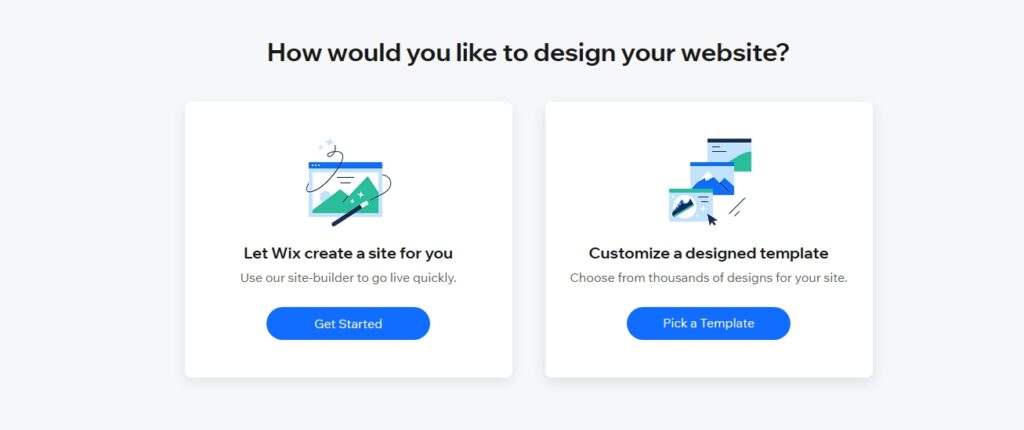
Whichever method you choose, ultimately you will be working with their drag-and-drop website builder.
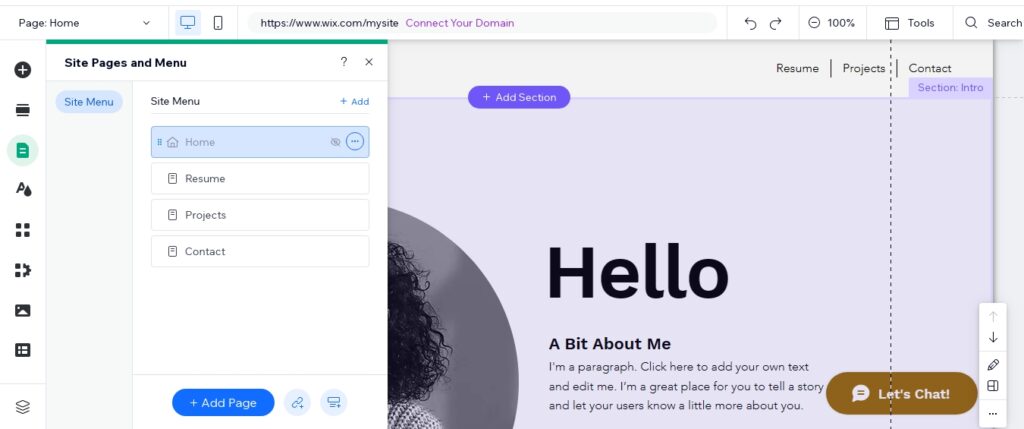
From the standpoint of a beginner, this is excellent, but it does have a drawback. Wix at the time of this writing, does not allow users to change the template of a website once it is created. The only way to change the template of a particular page is to create a whole new site and transfer everything to it. This can be a major hurdle when you want one of their website pages to stand out.
Now coming to WordPress, once you have sorted out your domain registrar and hosting service provider you will notice one thing straightaway. There is no walkthrough guide on how to get things started, you are on your own. But with the vast amount of available resources, finding your way around is not hard at all.
In order to create a unique website, head over to Appearance, select a theme, and start customizing it to your liking.
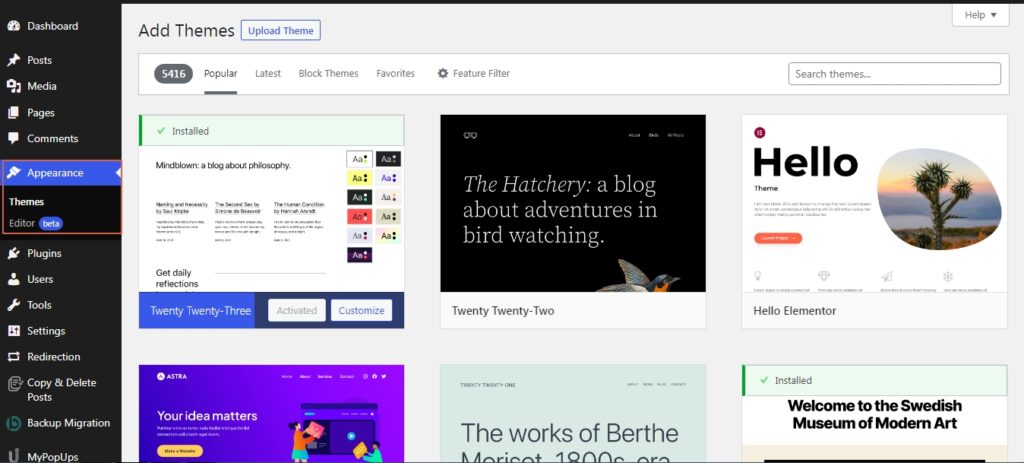
4. Customization Perspective
Now, that we have finally landed on the design aspect, which one offers more? More in terms of flexibility?
With WordPress, you have a lot of themes to choose from and we mean it. If you need a number, at the time of this writing there are over 10,000 themes in the repository. The theme library is just vast and unmatched. If the theme library doesn’t suit your taste, there are a lot of websites from which you can choose a premium theme. The design flexibility is unmatched here. To make the most of it knowing a bit of coding will be useful.
Now by default, it uses a block editor, which is a drag-and-drop builder for full site customization as long as you are using a block theme. The editor is available for pages and posts as well. You can also make use of other drag-and-drop builders such as Elementor, Beaver Builder, Divi, and so on.
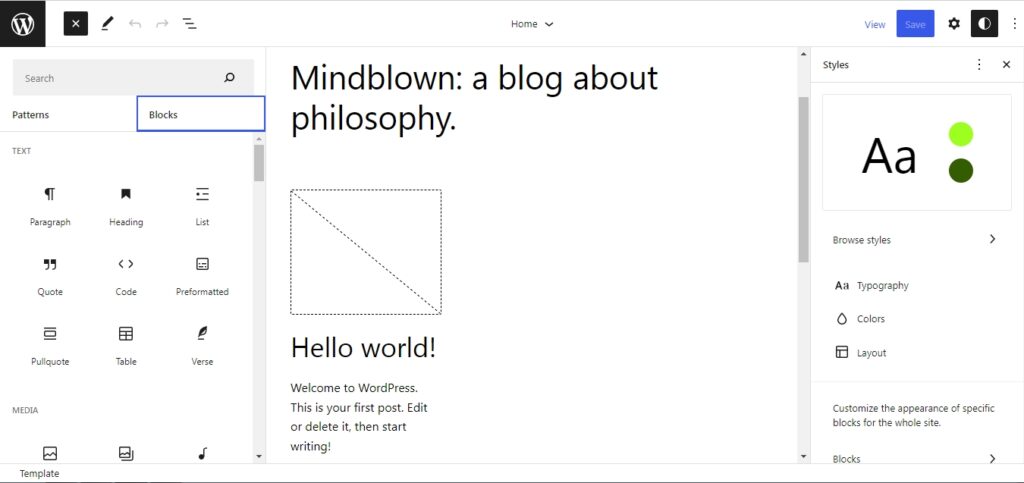
If you are not using a block theme, then the theme customization aspect would be taken care of via the theme customizer. But the block editor will be available for posts and pages.
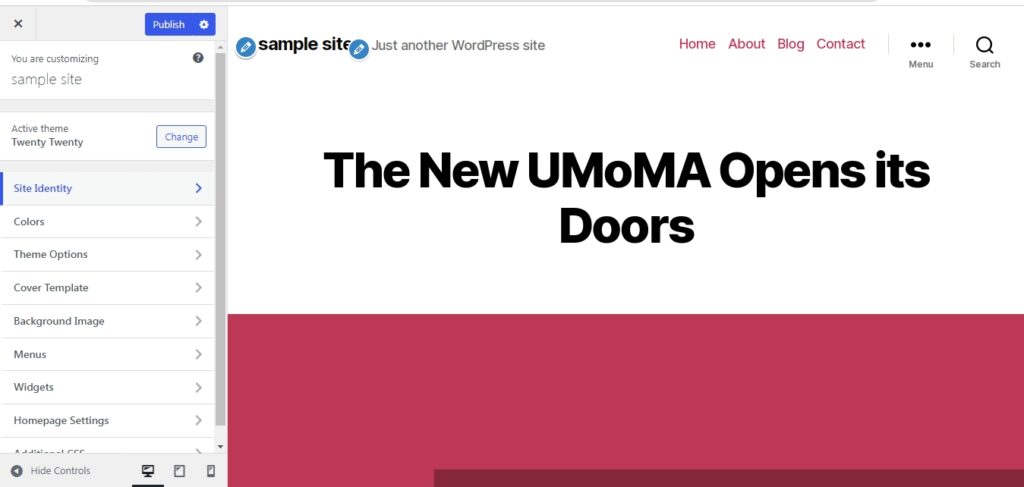
If you don’t seem to find a theme that suits your needs, creating a new theme is not an arduous task.
Remember how we mentioned not being able to switch templates in Wix after your website goes live? Well, here you won’t face that issue. The users can determine which template to use and can switch between templates, or even create new ones at any point in time.
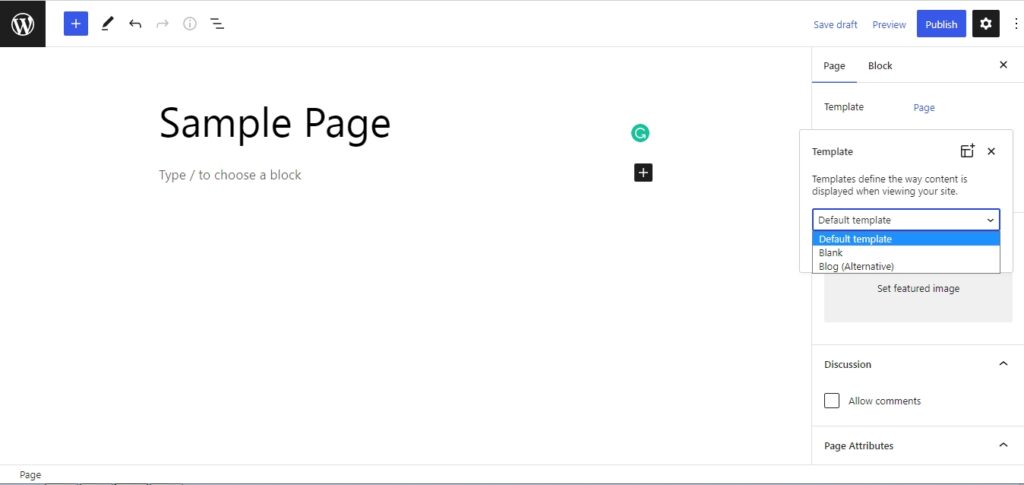
Now with Wix, you have a lot of templates to choose from and their drag-and-drop builder is intuitive.
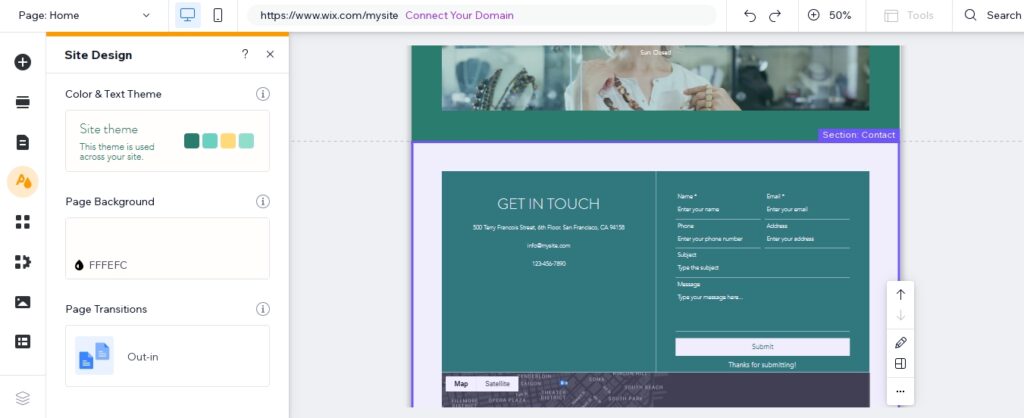
But what if you don’t find one to your liking? In such scenarios, you cannot depend on other theme libraries and it is not possible to upload your own theme.
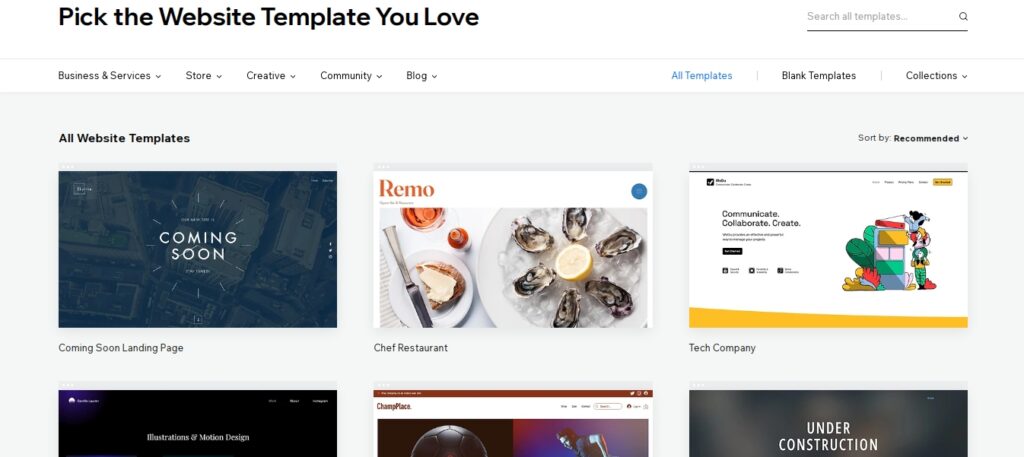
5. Plugins Library
Both platforms offer users the ability to choose plugins to bring in the needed functionality.
Wix AppMarket provides users with over 300 apps to bring the needed features. But here again, the numbers don’t match up against the vast plugins library of WordPress.
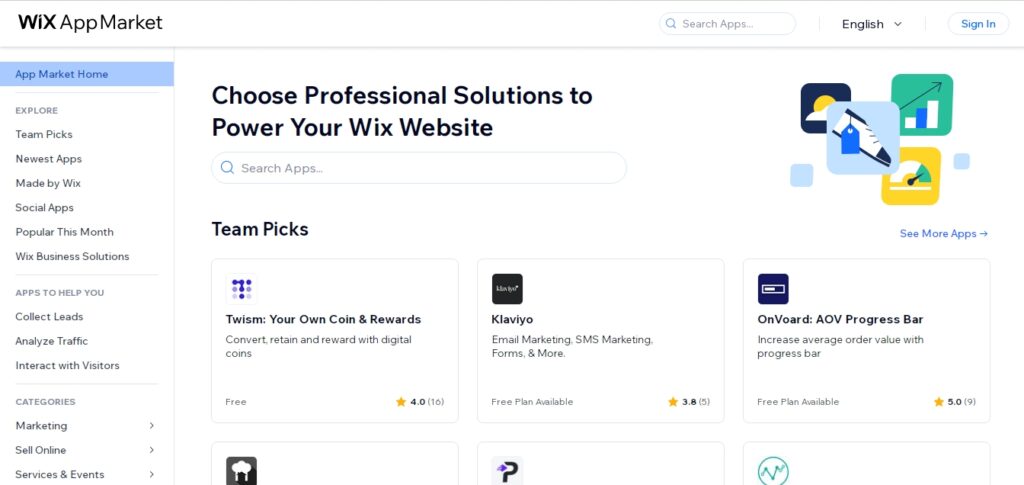
All the apps that you see are verified and cross-checked by the security teams, so security concern is never there. You can find free as well as paid plugins to be integrated with your website.
Now when we come to WordPress, the number of plugins and their varieties are just unmatched. For every plugin you choose, you get to try out a number of different plugins that offer the same functionality. The choice available to the users is a bit more. All the plugins are verified by the plugin review team before allowing them into the plugin repository.
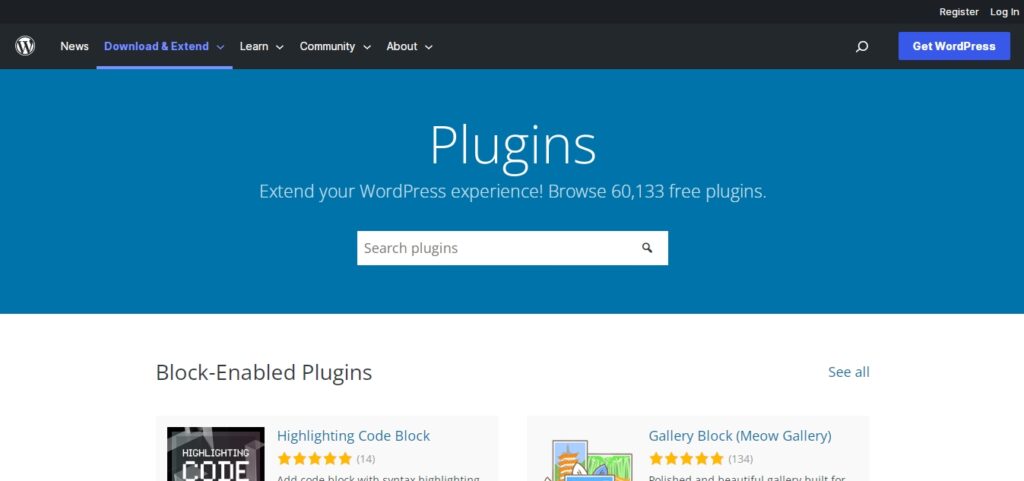
6. Security and Support
Wix handles the security side for you and with WordPress, it’s all up to you and your web host. With Wix, security maintenance and relevant patches are taken care of automatically. All this is possible because it is a SaaS offering. It also enables HTTPS and SSL on all its sites and provides DDoS protection, 24/7 monitoring, and more security features.
Since the source code is not available to the general public, trying to find any vulnerabilities to gain entry to unsuspecting sites is a pretty big task. There is no need to install additional security plugins to reinforce the website’s safety.

Now with WordPress, the security and maintenance aspect is in your hands, and also with the web host. Everything from ensuring that you are running on the latest version, DDoS protection, that the plugins you install are safe and don’t contain any malicious code, and so on. Since the source code is available to the general public, if there is a vulnerability in any of the older versions and you haven’t updated, then you are at risk of potential security breaches.
The users can also opt to use security plugins that can add an extra layer of security and they do offer a lot of valuable features. But even then, keep in mind that WordPress powers over 43% of websites, and keeping your site secure is not as daunting as it sounds.
Now the technical support side is also the same. The Wix team will handle everything for you. You can contact them 24/7 and address your concerns via live chat or through a callback. With WordPress, just like the security aspect, the technical support is also to be handled by your team and the web host.
Also read: What is WordPress DDoS Attack? 7 Ways To Protect Your Website From DDoS Attacks
7. eCommerce Support
To start an eCommerce store with Wix, one must sign up for their Business and eCommerce plans. It has a separate eCommerce platform that brings in all the needed features to run your store. One can start with their templates, and use APIs for bringing in extra functionality, multiple payment solutions, built-in analytics and SEO tools, and more.
But the biggest concern that users will have when opting to run an eCommerce store with Wix is the Payment Processing Fees. This will be levied on every transaction and also if you issue a refund, the transaction fees will not be paid back to you.
On the other hand, WordPress relies on plugins to create an online store, the most famous being WooCommerce. With WooCommerce, creating and setting up an online store is an easy task, but you are going to need to invest a bit more time to get everything initialized. One must choose the domain, a quality web host, etc. WooCommerce does come with its inbuilt analytics.
Both platforms support eCommerce functionality but in the end, it all boils down to the pricing and the features. With WordPress, you can do a bit of market analysis to see how much different web hosts are charging, and what features you get and then make a decision.
The Wix eCommerce plan starts at $27/month and offers unlimited bandwidth, 20 GB storage, and 5 video hours. The limited video hours can be a concern when it comes to marketing strategies.
Also read: Best Open-source eCommerce Platforms
8. Search Engine Optimization
Wix, in its initial stages, had its fair share of problems when it came to SEO, but all that has been ironed out except one. Wix websites, in comparison to WordPress websites, are a bit slow and this greatly impacts SEO. As search engine crawlers do consider page loading time a crucial factor in SEO rankings.
Here all the SEO tools that one needs are inbuilt into it. One can control the sitemap, robotos.txt, URL redirect, etc. The users can also search AppMarket for SEO plugins.
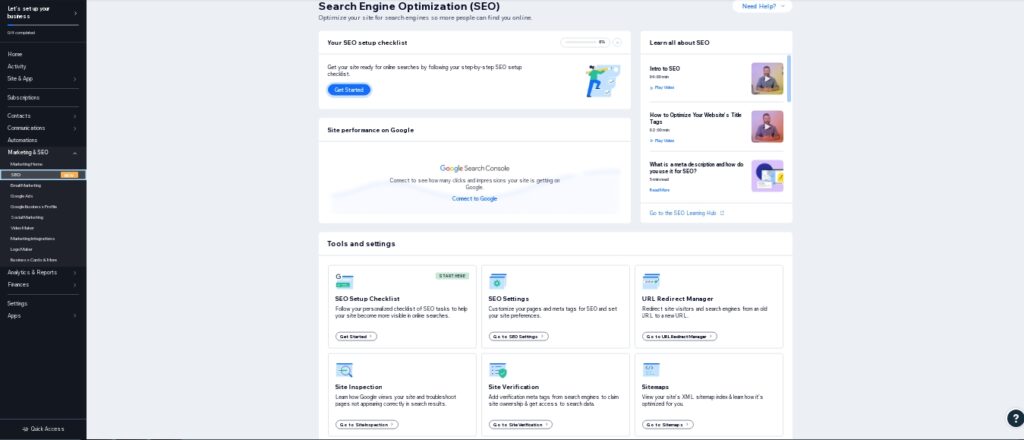
It also has SEO Wiz that walks you through all the changes that are needed to rank better.
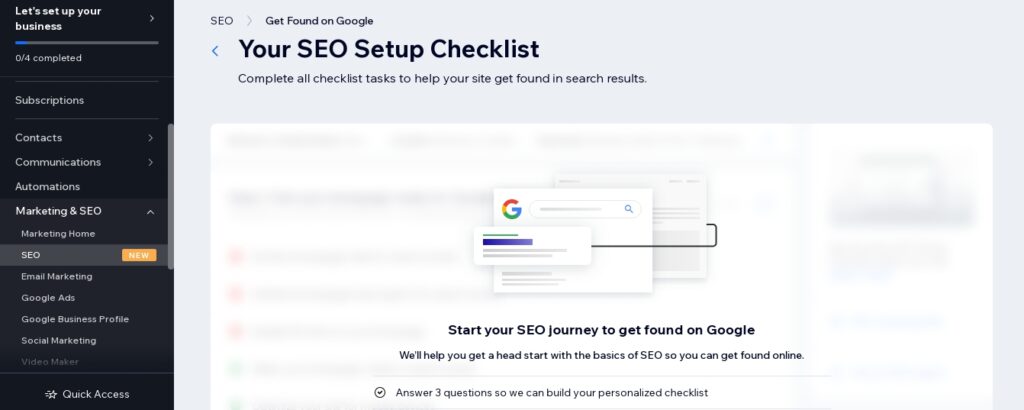
Whereas with WordPress, you need to take up the help of SEO plugins, even though some basic SEO features are available out of the box.
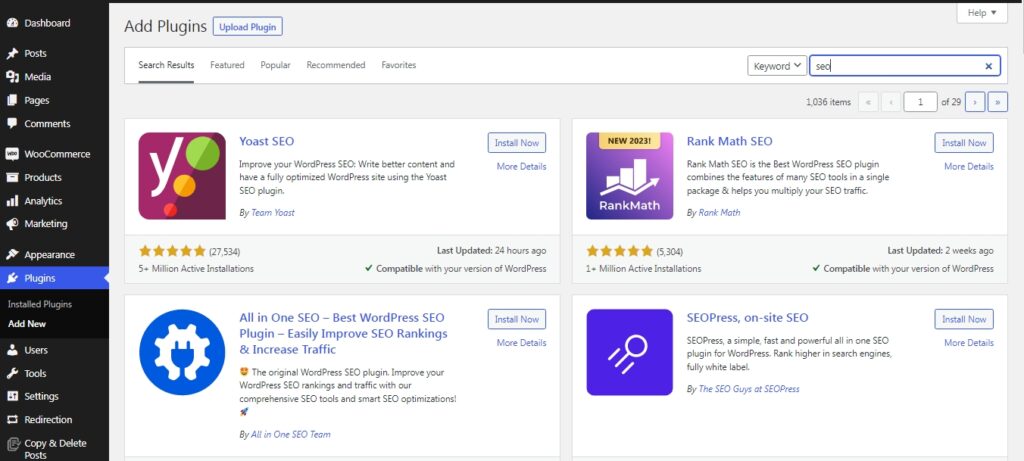
In addition to plugins, users can also choose themes that are SEO-friendly. Such themes focus extensively on code optimization for faster load times, schema markup, AMP compatibility, responsive designs, and more.
Now the only factor differentiating these two is how well you can optimize your website for loading time. In this regard, WordPress has a slight edge, as you can choose your web host, optimize the code, use caching plugins, SEO-focused themes, and many more to improve page loading times.
9. Blogging Platform
If blogging is your number one priority, then there is no debate; WordPress it is. As we mentioned, it started as a blogging platform before transitioning to a CMS. The tools and features it offers for blogging are unmatched and combined with the flexibility it offers, make it the best platform for blogging.
Wix also enables you to run a blog but compared to the competition, it still has a long way to go, especially in terms of flexibility. The counterpart has a lot of plugins that are valuable to bloggers, which is just missing in the Wix ecosystem.
Wrapping Up
Both these platforms offer a lot, but in the end, it all comes down to how much control you want over various aspects like customization, ease of use, pricing, and features.
